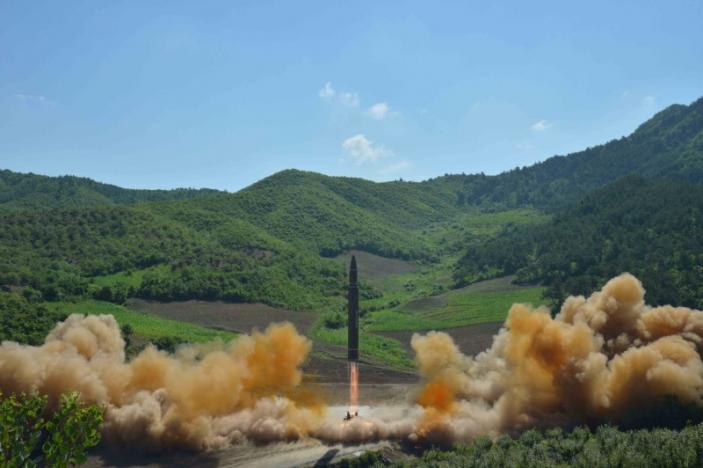
The news on Tuesday of a successful intercontinental ballistic missile test by North Korea has world leaders calling for restraint. Based on observations of the test, North Korea could potentially launch a weapon capable of reaching any part of Alaska. It’s a major development in the arms race on the Korean Peninsula. But in Alaska, the news has prompted more of a shrug than a shriek.
In day since the test, here were no runs on stores or major signs of widespread panic in the 49th state.
Capt. Anastasia Schimdt, an Air Force spokesperson for Alaskan Command at Joint Base Elmendorf-Richardson wrote in an email her office hadn’t received any inquires on the subject from the general public. Renee Oistadt, a public information officer with the Anchorage Police Department said the same thing.
Ethan Berkowitz is the mayor of Anchorage, a city that would presumably be a main target in Alaska for a hostile missile strike.
“The reasons why Alaskans are responding the way we have is because there’s no appreciable change in the threat level,” Berkowitz said in a phone interview Wednesday afternoon.
Though the mayor spoke with military officials about the missile test, he said this latest development doesn’t actually change any emergency response plans for the city currently on the books.
“We have complete confidence in the military to defend us, and we have the assurance that no matter what happens to us here in Alaska we’ll be able to take care of ourselves,” Berkowitz said.
A statement from Governor Bill Walker’s office expressed a similar sentiment, adding that the test “underscores why it’s so important to increase America’s military presence in Alaska.”
But amid relative calm from officials, some Alaskans were expressing worries on social media. One of them, Fairbanks resident Henry Cole, said this new development with North Korea feels substantial.
“They can now get me, and so that’s what makes me angry, because I’m now personally within the umbrella…that their missiles can reach,” Cole said.
In the event of armed confrontation, Cole thinks the Fairbanks area could make a pretty good target. It’s a population center with the Trans-Alaska Pipeline running through it, and two military bases of strategic importance. Just a hundred miles away is the anti-ballistic missile defense system at Fort Greely near Delta Junction.
But Cole isn’t hitting the panic button (on Tuesday afternoon he was getting ready to grill). He doesn’t think the North Korean regime is very likely to start shooting toward the area. But he’s frustrated by even the possibility after so many missed chances for diplomatic intervention.
“That pisses me off,” Cole said. “There have been opportunities to either act directly or to work with China, work with Japan, work with South Korea. And at least, to my view, none of those have happened. And now (North Korea is) sitting there with a big enough stick to reach out and hit us.”
The timing of the missile test might have also contributed to the muted response from Alaskans. Charles Wolforth is a columnist for the Alaska Dispatch News, and a radio host for the show “Outdoor Explorer” on KSKA in Anchorage. He said on a national holiday when weather across much of South Central was beautiful, people weren’t too focused on the news cycle. Himself included.
“I was at the 4th of July parade in Seldovia,” Wolforth said by phone from Kachemak Bay Wednesday. “Somebody said ‘Hey I heard that Korea tested this ICBM,’ and conversation didn’t really go any further because everybody’s out in the sunshine and watching the fish toss.”
Wolforth said in general, political life in Alaska takes a back seat during the height of summer.
“Once the fish start running…all the air goes out of it and people stop paying attention,” Wohlforth said.
He added that growing up in Anchorage during the Cold War he had to practiced duck-and-cover drills in school. It’s not a new idea for many Alaskans to be within striking range from a hostile country.
Zachariah Hughes reports on city & state politics, arts & culture, drugs, and military affairs in Anchorage and South Central Alaska.
@ZachHughesAK About Zachariah




